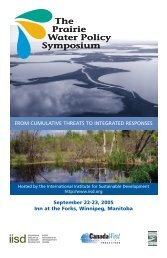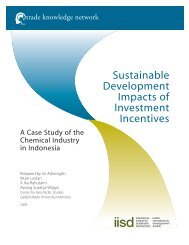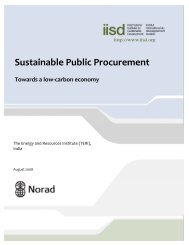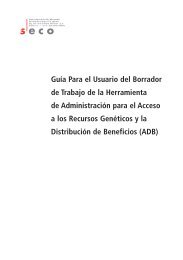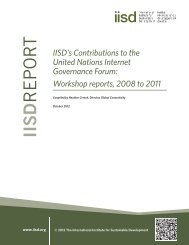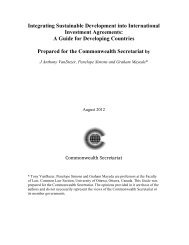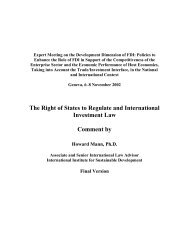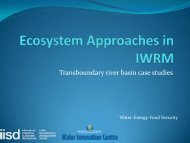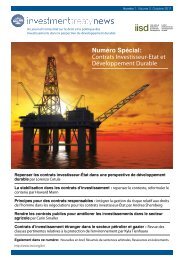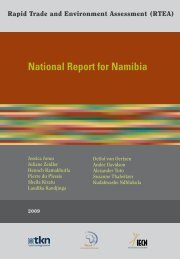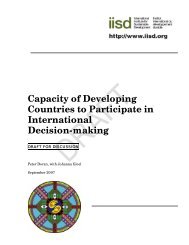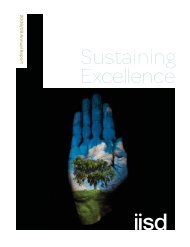Manitoba Climate Change Task Force - International Institute for ...
Manitoba Climate Change Task Force - International Institute for ...
Manitoba Climate Change Task Force - International Institute for ...
Create successful ePaper yourself
Turn your PDF publications into a flip-book with our unique Google optimized e-Paper software.
54<br />
MCCTF Report 2001 — <strong>Manitoba</strong> and <strong>Climate</strong> <strong>Change</strong>: Investing in our future<br />
Fossil Fuel Reserves • The quantity of a fossil fuel such as oil and coal that is known to<br />
exist, based on geological and engineering evidence, and that can be recovered under<br />
current economic conditions and operating capabilities.<br />
Fossil Fuel Resources • The quantity of fossil fuel that is thought to exist and that may<br />
be recoverable based on an explicit scenario <strong>for</strong> future economic conditions and operating<br />
capabilities.<br />
Global Warming • An increase in the near surface temperature of the earth. Global<br />
warming has occurred in the distant past as the result of natural influences, but the term<br />
is most often used to refer to the warming occurring as a result of increased emissions<br />
of greenhouse gases. Scientists generally agree that the earth’s surface has warmed by<br />
about 0.6 degrees Celsius in the past 140 years. The Intergovernmental Panel on<br />
<strong>Climate</strong> <strong>Change</strong> (IPCC) recently concluded that increased concentrations of greenhouse<br />
gases are causing a rise in the earth’s surface temperature.<br />
Green Corridors Initiative • Addresses the complex interrelationships among trade,<br />
transportation, environment and sustainable development spanning the Central Plains<br />
region of North America. Includes identifying and implementing bi-national and<br />
tri-national initiatives and partnerships <strong>for</strong> Canada, <strong>Manitoba</strong> and Winnipeg.<br />
Greenhouse Effect • The effect produced as greenhouse gases allow incoming solar<br />
radiation to pass through the earth’s atmosphere, but prevent most of the outgoing<br />
infrared radiation from the surface and lower atmosphere from escaping into outer<br />
space. The comparison is to a glass greenhouse capturing the sun’s warmth and heating<br />
the interior space. This process occurs naturally and historically has kept the earth’s<br />
temperature about 33 degrees Celsius warmer than it would otherwise be. Current life on<br />
earth could not be sustained without the natural greenhouse effect. See also Global<br />
Warming.<br />
Greenhouse Gas • Any gas that absorbs infrared radiation in the atmosphere. Greenhouse<br />
gases include water vapor, carbon dioxide (CO2), methane (CH4), nitrous oxide (N2O),<br />
halogenated fluorocarbons (HCFCs), ozone (O3), perfluorocarbons carbons (PFCs),<br />
sulphur hexafluoride (SF6) and hydrofluorocarbons (HFCs).<br />
Intergovernmental Panel on <strong>Climate</strong> <strong>Change</strong> (IPCC) • Composed of the world’s<br />
leading climate scientists, the IPCC was established in 1988 by the World Meteorological<br />
Organization and the United Nations Environment Programme. Its role is to assess<br />
scientific, technical and socio-economic in<strong>for</strong>mation relevant <strong>for</strong> the understanding of<br />
the risks associated with human-induced climate change.<br />
Joint Implementation • Article 6 of the Kyoto Protocol permits Joint Implementation<br />
whereby developed countries are able to invest in projects in other developed countries<br />
to acquire credits to assist in meeting their emissions targets. Countries are only able to<br />
use credits generated in the commitment period of 2008 to 2012. Participation is<br />
voluntary, and open to private and public entities.



